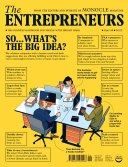
The Entrepreneurs
Do you have a big idea that you’d like to make a reality? Or perhaps you’re looking to take your company to the next level. If so, The Entrepreneurs is for you. The latest issue of Monocle’s business-focused annual asks whether executive coaching works, profiles the slower cities to set up shop in, picks the best brand logos – and much more.
In This Issue
Oops! No content was found.
Looks like we no longer have content for the page you're on. Perhaps try a search?
Return Home

